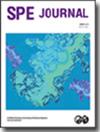Research on a Calculation Model of Cable Tension and Pumping Displacement of a Logging Tool String of Horizontal-Well Drillpipes
IF 3.2
3区 工程技术
Q1 ENGINEERING, PETROLEUM
引用次数: 0
Abstract
Summary With the vigorous development of unconventional oil and gas reservoirs, logging technology of horizontal-well drillpipes has become increasingly important. The improper selection of displacement during the pumping of drilling rods into horizontal wells can lead to accidents such as cable entanglement or tool-string pump detachment. Based on a comprehensive consideration of multiple factors such as drillpipe joints, small gap flow, pressure loss along the pipe, temperature, pressure, tool-string passability, and waterhole diameter variation, a cable tension analysis model for a logging tool string of a horizontal-well drillpipe is established. This model can predict a reasonable pumping displacement by analyzing the tension in the entire wellbore section, thereby avoiding cable entanglement or even tool-string pump detachment accidents during downhole operation. To verify the effectiveness of the model, we analyzed the cable tension during logging operations in Wells M1 and M2 using on-site test data and compared them with the measured tension data. The determination coefficient (R2), mean absolute error (MAE), and root mean square error (RMSE) were used to evaluate the degree of fit and accuracy of the model. The experimental results showed that the model can accurately predict the pumping displacement range before logging operations, ensuring that the cable does not entangle and the tool string is not pumped out during the downhole operation, thus providing effective methods and theoretical guidance for on-site drilling rod-pumping logging operations.水平井钻杆测井工具柱拉索张力及泵送排量计算模型研究
随着非常规油气藏的大力开发,水平井钻杆测井技术显得越来越重要。在将钻杆泵入水平井的过程中,如果排量选择不当,可能会导致电缆缠绕或工具柱泵脱离等事故。在综合考虑钻杆接头、小间隙流动、沿管压力损失、温度、压力、工具柱可通过性、水眼直径变化等因素的基础上,建立了水平井钻杆测井工具柱索张力分析模型。该模型可以通过分析整个井筒段的张力来预测合理的泵送排量,从而避免井下作业中电缆缠绕甚至工具柱泵脱离事故的发生。为了验证该模型的有效性,我们利用现场测试数据分析了M1井和M2井测井过程中的电缆张力,并将其与实测张力数据进行了比较。采用决定系数(R2)、平均绝对误差(MAE)和均方根误差(RMSE)评价模型的拟合程度和准确性。实验结果表明,该模型能够在测井作业前准确预测泵送排量范围,保证井下作业中电缆不缠绕、工具柱不抽出,为现场钻井抽油杆测井作业提供了有效的方法和理论指导。
本文章由计算机程序翻译,如有差异,请以英文原文为准。
求助全文
约1分钟内获得全文
求助全文
来源期刊

SPE Journal
工程技术-工程:石油
CiteScore
7.20
自引率
11.10%
发文量
229
审稿时长
4.5 months
期刊介绍:
Covers theories and emerging concepts spanning all aspects of engineering for oil and gas exploration and production, including reservoir characterization, multiphase flow, drilling dynamics, well architecture, gas well deliverability, numerical simulation, enhanced oil recovery, CO2 sequestration, and benchmarking and performance indicators.
 求助内容:
求助内容: 应助结果提醒方式:
应助结果提醒方式:


